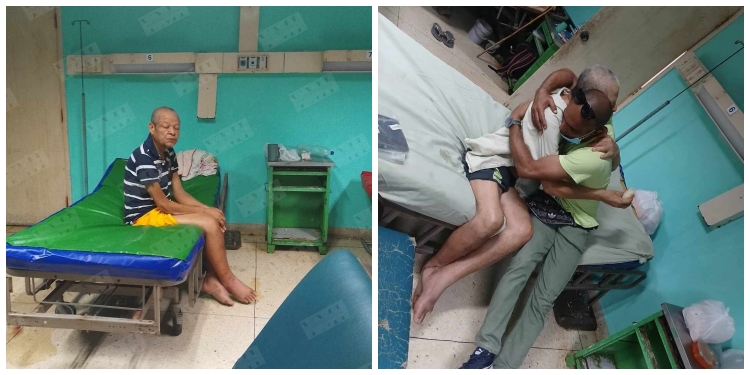AREQUIPA, Peru – A sick elderly man identified as Pedro Ismael Rodríguez Labrada was abandoned by his relatives at the Juan Bruno Zayas Clinical Surgical Hospital in Santiago de Cuba.
As reported by independent journalist Yosmany Mayeta Labrada in your Facebook pagethe man is currently hospitalized in Room 5D Bed 6 and suffers from a mental disorder.
“His sister was the one who accompanied him, but she left and left him in the hospital at the mercy of someone who has a good heart. We are the patients and family members who are in the cubicle who care for him,” a source inside the health center told the reporter.
The old man was abandoned with few things and just a single change of clothes, so Mayeta Labrada called on the Humanitarian Aid organizations in Santiago de Cuba that could assist the sick person with supplies and supplies.
One day after the call was made, Yasser Sosa Tamayo, who has a group to Help Needy and Helpless People in the city, went to the Hospital and visited Pedro Ismael.
Through another postMayeta Labrada thanked all the people who showed solidarity through social networks and offered their help as a gesture of humanism.
“Whoever wishes to help the hospitalized man and other people who need help in Santiago de Cuba, can directly contact Mr. Yasser, who, with proven Charity action, has helped hundreds of people in the streets of Santiagueras,” the note highlights.
Wandering people in a Cuba in crisis
Last July, the Cuban regime approved a new policy in response to the increase in homeless and begging people on the streets of the Island, report a report from the official media Cubadebate.
As the Cuban authorities considered at a meeting of the Council of Ministers, the indigent people in the country are not the result of circumstances, but of “behavior.”
In this regard, after ten years of the policy for the care of people with “wandering behavior”, during the meeting its update was approved, “based on the situation that the country is experiencing today.”
The Minister of Labor and Social Security, Marta Elena Feitó Cabrera, defined wandering behavior as “a multi-causal disorder of human behavior, which constitutes a way of life characterized by instability and insecurity of the place of stay, lack of self-care and economic autonomy, as well as favorable life project. “There is usually evidence of transgression of the rules of coexistence and social discipline.”
The owner thus rejected the Government responsibility in the proliferation of destitution in a context marked by crisis, scarcity, low pensions and failed economic policies.
With the new policy, the regime seeks to delegate responsibility to the Municipal Administration Councils for “prevention, care, control, monitoring and decision-making in relation to care for people with wandering behavior.”















